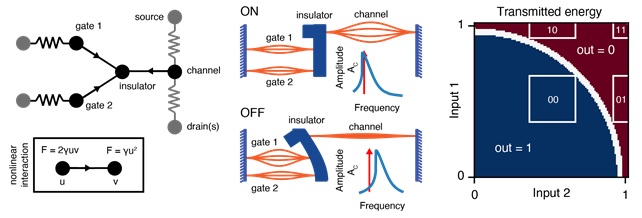2 Springtronics
Structural resonances have unique information-processing capabilities. However, we do not yet know how to build devices that take full advantage of their properties. This is a consequence of the novelty of the field. While conventional electronics builds upon a century of accumulated expertise, information processing with elastic waves is a recent area of research.
To reach the goal of building novel mechanical computing systems, we investigate the laws, circuit topologies and design strategies relevant to processing information with elastic degrees of freedom. We refer to this area of research as springtronics, because we aim to use masses and springs to realise the functionalities of electronic devices, albeit with superior power consumption and electromagnetic interference characteristics. We investigate both digital and analog forms of springtronic information processing.

Processing information consumes significant energy. This consumption limits the battery duration for portable devices, and is a growing environmental concern: Nowadays, information technology is assumed to have a carbon footprint larger than the airline industry. For this reason, it is crucial to develop novel methods of low-power computing, and to understand how the laws of physics impact our ability to compute with zero energy.
The hypersmart matter group at AMOLF aims to understand the fundamental energy limits of computing, and to identify novel strategies for energy-efficient, green information processing. We tackle this problem by combining the framework of stochastic thermodynamics with a hands-on approach: We design and build mechanical logic gates and computers, shrinking our devices to approach the regime where thermodynamic fluctuations are relevant. Mechanical mass-spring systems are near ideal degrees of freedom, with vanishing dissipation and controllable nonlinearity. In addition, we can measure them so precisely as to resolve thermomechanical fluctuations. Mechanical systems are a great platform to investigate fundamental physics, and simultaneously a promising avenue to realise logic operations near their ultimate performance limits.


